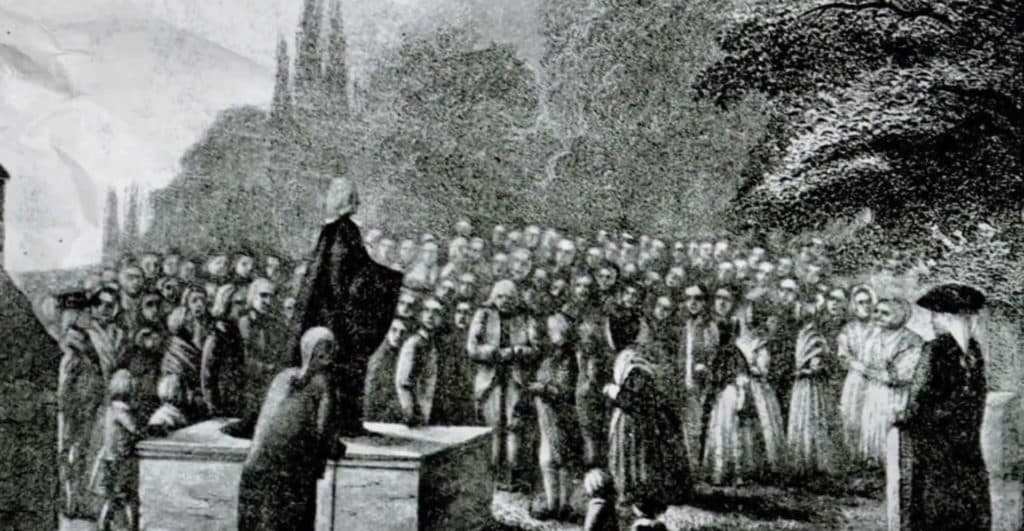The First Great Awakening refers to a time of religious revival in America. It was a time when circuit preachers rode from town to town preaching about the grace of Jesus and pushing back against religion.
It took place during the 1730s - 1740s and included such pastors as Jonathan Edwards, George Whitefield (who captivated Benjamin Franklin), David Brainard, Samuel Davies, and many others throughout the 13 original colonies.
First Great Awakening Facts: Beginnings
The First Great Awakening cannot be mentioned without bringing up the Reformation. The Reformation that occurred in Europe challenged many ideas that had been held for centuries since the fall of the Roman Empire.
This idea that man was saved by grace and not by works challenged the core of what the church taught. At the time the Roman Church controlled everything when it came to doctrine and the common man had no means to argue or even think differently.
When Martin Luther came onto the scene with his 95 Theses things began to change. With the help of the printing press, the information spread quicker than the church could keep up with it. These 95 Theses would lead to different ideas the two most predominant was the separation of powers and self-government.
These ideas that Luther argued about in the 16th century would influence future groups especially those in England. By the time of Jamestown, Plymouth Colony, and Massachusetts Bay Colony England had split from the papacy and had its own Church of England. While each group that arrived in the New World came for various reasons they each believed in religious freedom.
By the time of the First Great Awakening, the colonies had grown from small little business ventures to over 1 million colonists and from its first permanent colony to thirteen colonies. Each colony had varying degrees of religious freedom which set the stage for a great revival.
The Great Awakening in America would finish off what the Reformation started. It would end the control the church had on others by calling into question their motives.

First Great Awakening Facts: Jonathan Edwards
It is hard to pinpoint an actual date that the Great Awakening began because it was more of a movement than an event. Like any movement, it continued to grow over time and without realizing it spreads.
However, there was a sermon that was given in 1741 by Jonathan Edwards that many marks as the known beginning of the Great Awakening.
The sermon was called, Sinners in the Hands of an Angry God. This sermon sent shockwaves throughout the New England Colonies and brought many to repentance. This sermon was so powerful that Edwards was often interrupted by people asking, "What do I need to do to be Saved?
First Great Awakening Facts: Unification of the Colonies
From a geographical perspective, the Great Awakening unified the colonies. At the time of the Great Awakening, the colonists identified their colonies as separate countries. Circuit preachers changed that perception.
George Whitefield became the most notable evangelist of the Great Awakening. His powerful sermons and voice could often be heard by thousands of people. He was known for his ability as an orator and made several trips to America to preach revivals throughout the colonies.
Unlike many of the other religious leaders of the day, Whitefield was known for his ability to control an audience and appeal to their heart. He also traveled throughout the colonies rather than staying at a local congregation.
He rode the circuit from New Hampshire to Georgia to the frontier and even preached to African slaves. He did not care who his audience was just that they heard the words of Jesus.
His travels and spread of Great Awakening beliefs unified the colonies geographically and religiously.
First Great Awakening Facts: American Revolutionary War
There is a debate as to whether or not the Great Awakening had any influence on the American Revolutionary War. I personally don't see how there is a debate about whether or not it influenced the Revolutionary generation, but how much.
After the Great Awakening religion and its power changed in America. There were now congregations that formed as people felt free to begin new churches that had differences with other churches, new universities sprung up that challenged the hegemony of Yale and Harvard, and the new ideas of a younger generation challenged that of an old generation.
To say the Great Awakening did not influence the American Revolutionary War is to say the 60s did not influence Americans today.
Calvinism and Jonathan Edwards provided pre-Revolutionary America with a radical and democratic social and political ideology and that evangelical religion embodied and inspired a thrust toward American nationalism. Colonial Calvinism was the basis for the American Great Awakening and that in turn lay at the basis of the American Revolution.
The Great Awakening provided the radical American nationalism that prompted the Revolution. Awakening preachers sought to review God's covenant with America and to repudiate the materialistic, acquisitive, corrupt world of an affluent colonial society.
The source of this corruption lay in England, and a severance of the ties with the mother country would result in a rededication of America to the making of God's Kingdom.
First Great Awakening Facts: Online Resources
- Christian-History.org
- Conservapedia - First Great Awakening
- Basic Concepts of The Great Awakening
- All Things Liberty - Great Awakening and the American Revolution
- Wallbuilders
- The History Junkie's Complete Guide to Colonial America
- The History Junkie's Complete Guide to 13 Original Colonies
- The History Junkie's Complete Guide to American Revolutionary War
